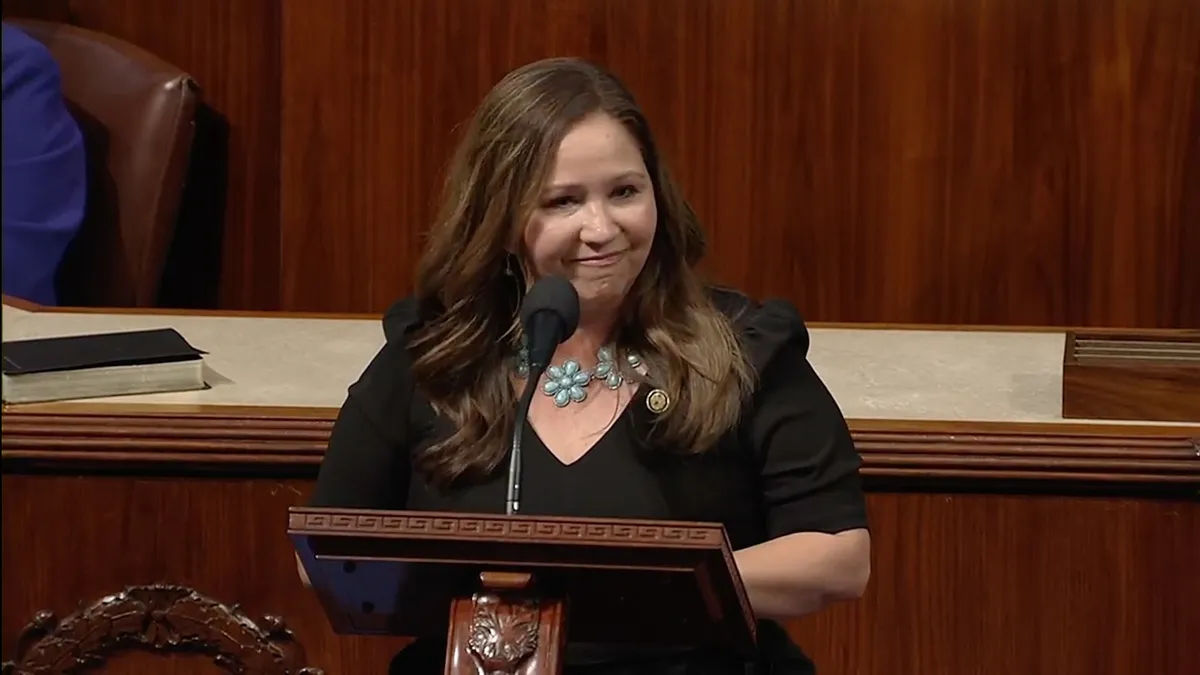
On Wednesday, Arizona Democrat Adelita Grijalva was officially sworn into the House of Representatives, marking a significant moment seven weeks after her victory in a special election. This swearing-in comes just as the House prepares to address a Senate-passed bill aimed at reopening the government. The oath of office was administered by House Speaker Mike Johnson, prompting a resounding round of applause from her fellow Democrats.
Following her swearing-in, Grijalva took to the House floor to speak passionately about pressing issues. She promptly signed a discharge petition, a procedural move designed to compel the Department of Justice to release comprehensive files related to the convicted sex offender, Jeffrey Epstein. "Justice cannot wait another day," Grijalva asserted, highlighting the urgency of the matter.
During her speech, she referenced newly released emails from House Democrats that indicated Epstein's connections to former President Donald Trump. "Our democracy only works when everyone has a voice," Grijalva remarked, emphasizing the importance of amplifying the voices of survivors of violence and exploitation. She specifically acknowledged Liz Stein and Jessica Michaels, both of whom are survivors of Epstein's abuse and were present in the gallery.
In her address, Grijalva urged her fellow lawmakers on Capitol Hill to take decisive action against the Trump administration. "It's past time for Congress to restore its role as a check and balance," she stated, advocating for the rights of immigrant communities, veterans, public schools, children, educators, and LGBTQ+ rights. Grijalva’s resolve to fight for the American people resonated strongly with her constituents, as she declared her commitment to standing up for their rights and needs.
Grijalva's election victory came shortly after Speaker Johnson dismissed lawmakers following the passage of a clean continuing resolution to fund the government in mid-September. This delay in her swearing-in has been a point of contention, leading the state of Arizona to sue the House of Representatives over Johnson's decision. Lawmakers from both parties have expressed their opposition to the delay, indicating a broader frustration with the current legislative environment.
After Grijalva signed the discharge petition, it reached the required 218 votes needed to force a vote in the House. The petition, spearheaded by Representatives Thomas Massie and Ro Khanna, must now undergo a waiting period of seven legislative days before it can be considered on the floor. Once this period is over, any member who signed the petition can call for a vote, prompting Speaker Johnson to schedule it within two legislative days.
The earliest the House could potentially vote on the discharge petition is in early December, following the Thanksgiving recess. However, multiple procedural votes and extended debates will precede any final vote. Speaker Johnson may also choose to table the vote or refer the bill to committee, potentially obstructing its passage.
If the measure successfully passes the House, it will then move to the Senate, where its fate remains uncertain under the leadership of Senate Majority Leader John Thune. Speaker Johnson has voiced his opposition to the discharge petition, citing ongoing investigations by the House Oversight Committee regarding Epstein. The committee has already released thousands of documents from the Department of Justice, including court filings and trial transcripts related to Epstein and his associate, Ghislaine Maxwell, who has denied any wrongdoing.
In summary, Grijalva's swearing-in and her immediate actions in the House signify a pivotal moment in the ongoing fight for justice regarding Epstein's crimes. As she champions the cause for survivors and advocates for the American people, the upcoming legislative battles will be closely watched by constituents and lawmakers alike.